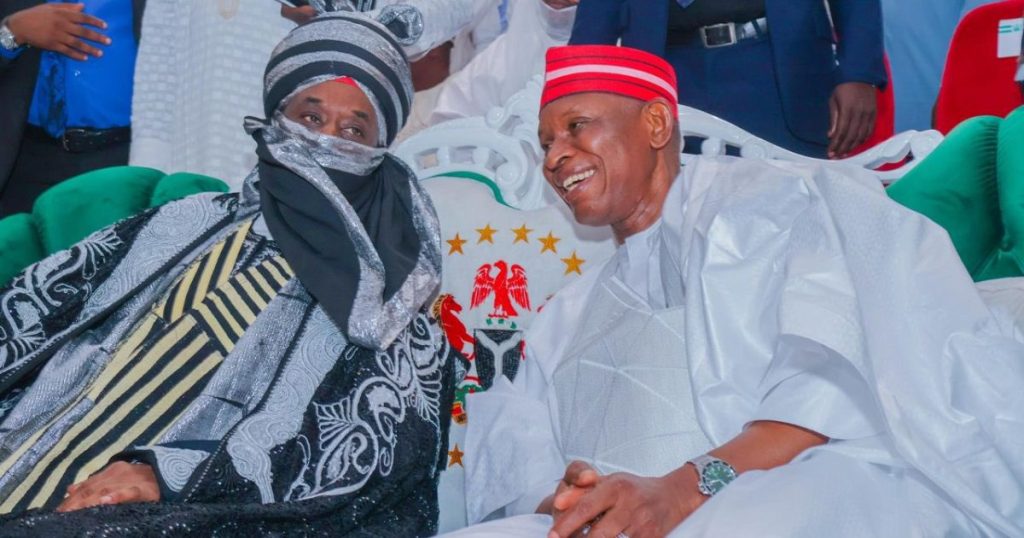The Eid-el-Fitr celebrations in Kano State, Nigeria, were marked by a departure from tradition amidst underlying tensions surrounding the Sallah Durbar, a customary horse procession. Emir Muhammadu Sanusi II, the 16th Emir of Kano, opted for a motorized convoy to pay his Sallah homage to Governor Abba Yusuf, foregoing the customary horse ride. This decision followed a series of events stemming from the existence of two rival emirs in Kano and the potential security risks associated with their simultaneous Durbar celebrations. The 15th Emir, Aminu Ado Bayero, having initially planned a Durbar procession, ultimately cancelled the event due to security concerns, a decision echoed by the state’s Commissioner of Police who imposed a ban on all Durbar activities. Emir Sanusi supported this decision, advocating for calm among the populace.
The backdrop to this modified Sallah celebration was the complex situation surrounding the two emirates. The presence of two rival emirs, each with their own following, heightened the possibility of clashes during the festivities. The police, recognizing this potential threat, took proactive steps to maintain order by banning the Durbar altogether. This action likely played a significant role in Emir Sanusi’s decision to travel by car, prioritizing safety and minimizing any potential triggers for conflict. His gesture can be interpreted as a move towards de-escalation and a commitment to peaceful coexistence within the state.
Emir Sanusi’s visit to the Government House was characterized by an exchange of mutual respect and appreciation between him and Governor Yusuf. The Emir commended the Governor for his focus on key developmental areas such as education, healthcare, agriculture, and security, highlighting the positive impact of subsidized farming implements provided by the government. He further praised the State House of Assembly for their role in restoring order within the Emirate Council and encouraged local government chairmen to emulate the Governor’s proactive approach to governance. This public display of support for the Governor’s initiatives underscored a spirit of collaboration between the traditional leadership and the elected government.
Governor Yusuf, in return, expressed his gratitude for Emir Sanusi’s commitment to peace and unity within the state. He acknowledged the Emir’s consistent advocacy against social vices and his efforts to bridge divides among different Islamic sects. This reciprocal commendation highlights a shared vision for a harmonious Kano State. The Governor’s description of Kano as one of the most peaceful states in Nigeria, coupled with his administration’s pledge to maintain this peace, signaled a commitment to stability and security – a goal seemingly aligned with Emir Sanusi’s actions surrounding the Sallah celebrations.
The Governor also highlighted his administration’s efforts towards transforming Kano into a modern megacity, emphasizing improvements in infrastructure and public services. His mention of a competition among public officials suggested a drive towards increased efficiency and accountability within the government. This focus on development and modernization, coupled with the emphasis on peace and security, paints a picture of a government striving to create a prosperous and stable environment for the people of Kano. The Emir’s endorsement of these efforts further strengthens the message of collaborative governance and shared responsibility for the well-being of the state.
In conclusion, the 2023 Sallah celebrations in Kano State presented a unique scenario. The traditional Durbar was replaced by a more subdued, yet significant, exchange between Emir Sanusi II and Governor Abba Yusuf. Against the backdrop of potential tension surrounding the dual emirates and security concerns, the Emir’s decision to forgo the horse procession and travel by car demonstrated a prioritization of peace and stability. The mutual expressions of respect and shared goals between the Emir and the Governor further emphasized a commitment to collaborative governance for the betterment of Kano State. This year’s Sallah, therefore, served not only as a religious observance but also as a testament to the delicate balance of tradition and pragmatism in navigating complex socio-political landscapes.


